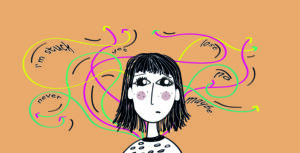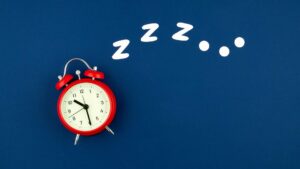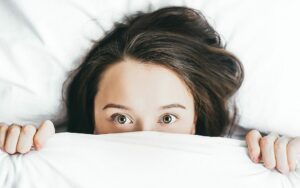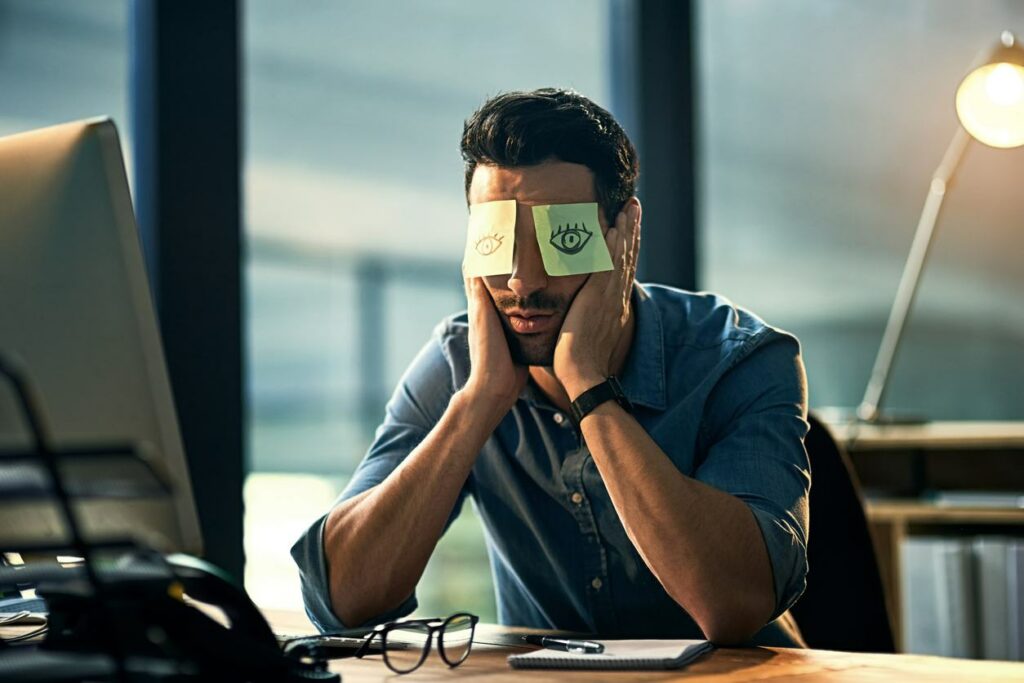Did you know that ADHD can have a significant impact on your sleep? In fact, studies have shown that people with ADHD are more likely to experience sleep problems than those without the disorder. If you’re struggling to get the sleep you need, it’s important to understand the link between ADHD and sleep so that you can take steps to address the issue. In this blog post, we’ll discuss the relationship between ADHD and sleep, as well as some of the most common sleep problems associated with ADHD. We will also offer some tips on how to get the best sleep possible if you have ADHD.
Contents
Defining ADHD
 Typically, ADHD is a condition that is diagnosed in childhood. It is characterized by a persistent pattern of inattention and/or hyperactivity-impulsivity that interferes with functioning or development. However, ADHD can also affect adults. According to the National Institute of Mental Health, an estimated four percent of American adults live with ADHD.
Typically, ADHD is a condition that is diagnosed in childhood. It is characterized by a persistent pattern of inattention and/or hyperactivity-impulsivity that interferes with functioning or development. However, ADHD can also affect adults. According to the National Institute of Mental Health, an estimated four percent of American adults live with ADHD.
There are three types of ADHD: inattentive type, hyperactive-impulsive type, and combined type. Inattentive type is characterized by symptoms of inattention, but not hyperactivity-impulsivity. Hyperactive-impulsive type is characterized by symptoms of hyperactivity-impulsivity, but not inattention. The combined type is characterized by symptoms of both inattention and hyperactivity-impulsivity.
Symptoms of ADHD can vary from person to person. They may also change over time. For example, symptoms may be more severe during childhood and early adolescence but may lessen during adulthood.
Link Between ADHD And Sleep Problems
 It is no secret that sleep is a part of a healthy lifestyle. Getting enough sleep is crucial for overall health and well-being. However, people with ADHD often have difficulty getting the sleep they need. In fact, research has shown that people with ADHD are more likely to experience sleep problems than those without the disorder. There are a number of reasons why ADHD may lead to sleep problems. Some of these are the following.
It is no secret that sleep is a part of a healthy lifestyle. Getting enough sleep is crucial for overall health and well-being. However, people with ADHD often have difficulty getting the sleep they need. In fact, research has shown that people with ADHD are more likely to experience sleep problems than those without the disorder. There are a number of reasons why ADHD may lead to sleep problems. Some of these are the following.
- Starting with the very obvious, people with ADHD may have difficulty falling asleep because they are hyperactive or have difficulty focusing on relaxing.
- ADHD can also lead to sleep problems because of the medications used to treat it. Stimulant medications, such as methylphenidate and amphetamine, are commonly used to treat ADHD. These medications can cause insomnia or make it difficult to stay asleep.
- People with ADHD may also have sleep problems because of their anxiety or depression. Anxiety and depression are common comorbid conditions in people with ADHD. These conditions can make it difficult to fall asleep or stay asleep.
- Certain environmental factors can also contribute to sleep problems in people with ADHD. For example, noise or light may make it difficult to fall asleep or stay asleep. Similarly, having a job or family responsibilities can make it difficult to get enough sleep.
- Furthermore, nightmares are a scary reality for many with ADHD. One study found that adults with ADHD are more likely to experience nightmares than adults without ADHD. Nightmares can cause significant distress and interfere with daytime functioning.
- In cases when one does manage to fall asleep, it becomes an entirely new challenge to stay asleep. People with ADHD are more likely to have continuous sleep cycles which means that they will have more periods of light sleep and be easily awakened.
- On the contrary, waking up in the morning can be equally as difficult. People with ADHD are more likely to have delayed sleep phase syndrome. This is a condition where people have difficulty falling asleep at a regular time and waking up in the morning. As a result, people with this condition may feel tired during the day.
- Lastly, the REM sleep, which is the most crucial part of the sleep cycle, is often disrupted in people with ADHD. This can lead to daytime fatigue and sleepiness.
All of these factors can lead to sleep problems in people with ADHD. These sleep problems can interfere with work, school, and other important aspects of life. If you or someone you know has ADHD and is experiencing sleep problems, it is important to talk to a health professional for help.
Types Of Sleeping Problems Caused By ADHD
We have understood all the ways ADHD causes issues with our sleep. However, things can spiral out of control and cause clinical sleeping issues. These are a few types of sleeping disorders that are commonly diagnosed in people with ADHD.

- The first and most common type of sleep disorder is insomnia. Insomnia is defined as difficulty falling asleep or staying asleep. People with insomnia often wake up feeling tired and unrefreshed. They may also have difficulty concentrating during the day.
- Another common type of sleep disorder in people with ADHD is sleep apnea. Sleep apnea is a condition where a person stops breathing for short periods of time during sleep. This can cause difficulty staying asleep and may lead to daytime fatigue.
- Restless legs syndrome (RLS) is a condition that causes an irresistible urge to move the legs. This can make it difficult to fall asleep and may cause daytime fatigue.
- Another daunting sleep disorder that happens because of ADHD is sleepwalking. This disorder is exactly what the name suggests. It implies that a person gets up and walks around during sleep. This can be dangerous as the person may not be aware of their surroundings and could hurt themselves.
- Narcolepsy is a consequent disorder of ADHD. It is a condition characterized by excessive daytime sleepiness. People with narcolepsy may fall asleep during the day, even when they are in the middle of an activity.
These are just a few of the many sleep disorders that can be caused by ADHD. If you or someone you know has ADHD and is experiencing sleep problems, it is important to talk to a health professional for help.
Consequences
ADHD by itself has severe and damaging consequences. However, when combined with sleep disorders, it can be a recipe for disaster. Sleep problems caused by ADHD can lead to:
- Poor school or work performance: This is the foremost and very obvious consequence of having ADHD. It is hard to focus and be productive when you are exhausted all the time.
- Decreased quality of life: When you don’t have enough energy or concentration to do the things you love, it takes a toll on your mental health and overall happiness.
- Increased risk of accidents: Drowsy driving is one of the most common and dangerous consequences of sleep disorders. It is estimated that drowsy driving causes about 100,000 car accidents each year.
- Difficulty concentrating: As we have discussed earlier, one of the main symptoms of ADHD is difficulty concentrating. When you add sleep deprivation to the mix, it becomes even harder to focus.
- Moodiness: When we have a good night’s sleep, we wake up feeling refreshed and ready to face the day. However, when we don’t get enough sleep, we wake up feeling groggy and irritable. This can lead to moodiness and increased anxiety.
- Emotional and behavioral problems: The lack of good quality sleep can take a toll on our mental health. It can cause problems with emotional regulation and lead to behavioral issues.
- Relationship problem: Lastly, sleep problems can also cause strain in our relationships. When we’re tired, we’re less patient and more likely to snap at the people we love.
All of these consequences can have a significant impact on a person’s life. If you or someone you know has ADHD and is experiencing sleep problems, it is important to talk to a health professional for help. Getting treatment for both ADHD and sleep disorders can help improve your quality
Ways To Manage
 Fortunately, there are a lot of ways to manage and treat ADHD and sleep disorders. There are some common things that can help both these conditions. However, if your sleep disorder is severe, it is important to talk to a health professional for help.
Fortunately, there are a lot of ways to manage and treat ADHD and sleep disorders. There are some common things that can help both these conditions. However, if your sleep disorder is severe, it is important to talk to a health professional for help.
Some of the things that can help both ADHD and sleep disorders include:
- Sticking to a sleep schedule: This means going to bed and waking up at the same time every day. This can help regulate your body’s natural sleep rhythm and make it easier to fall asleep.
- Creating a relaxing bedtime routine: This can involve things like taking a warm bath, reading a book, or stretching. Doing these things can help your body and mind relax and prepare for sleep.
- Eating right: Eating a healthy diet consisting of fruits, vegetables, and whole grains can help improve your energy levels and concentration.
- Limiting caffeine: Caffeine is a stimulant and can make it harder to fall asleep. It is best to avoid caffeine in the evening or limit it to one cup of coffee.
- Exercising: Exercise can help improve sleep quality. However, it is important to avoid exercise in the few hours before bedtime as it can make it harder to fall asleep.
- Managing stress: Stress can be a major trigger for both ADHD and sleep disorders. Learning how to manage stress can help improve both conditions.
These are some simple hacks and ways to manage one’s lifestyle, which in turn helps one’s disorders. However, in some cases, ADHD can be rather chronic or be because of other factors. In these instances, further professional intervention is required.
For ADHD
Since ADHD is a neurological disorder, there are some specific treatments that can help. The most common treatment for ADHD is medication. Stimulant medications like methylphenidate and amphetamines are the most commonly prescribed medications for ADHD. These medications can help improve focus and concentration. Non-stimulant medications like atomoxetine and guanfacine are also sometimes prescribed for ADHD.
In addition to medication, there are also some non-medical treatments that can help with ADHD. These include behavior therapy, cognitive behavioral therapy, and psychotherapy. These therapies can help people with ADHD learn how to manage their symptoms and improve their quality of life.
For Sleep Issues
Sleep issues also require specific treatments in order to be effectively managed. If you have a sleep disorder, it is important to talk to a health professional for help. They will be able to diagnose your sleep disorder and recommend the best treatment for you.
There are a variety of different treatments for sleep disorders. The most common treatment for insomnia is cognitive behavioral therapy. This type of therapy can help people with insomnia learn how to change their thoughts and behaviors around sleep. Other treatments for sleep disorders include medications. The medication works by helping people fall asleep and stay asleep. Medications that are commonly used to treat sleep disorders include benzodiazepines, non-benzodiazepines, and antidepressants.
There are also other nature-oriented methods like using herbs or essential oils, massages, or acupuncture to help one improve their quality of sleep. These can be used in conjunction with the methods above or on their own.
There are a lot of ways to manage and treat ADHD and sleep disorders. These are just some of the most common and effective methods. If you or someone you know has ADHD or a sleep disorder, talk to a health professional for more information.
Conclusion
In the end, we can conclude that it’s important to understand the link between ADHD and sleep because the two conditions can have a significant impact on each other. There are various ways to manage both conditions, and it’s important to seek professional help if you’re struggling.
If you or someone you know is looking for psychological help, Therapy Mantra is here for you. We are the leading providers of online therapy and counseling. Our team of highly trained and experienced therapists can provide assistance at the most affordable rates. Contact us today to learn more about our services. You may also visit our website to book an online therapy session or download our free Android or iOS app for more information.


